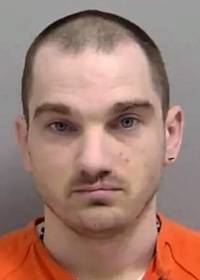
The jury in the upcoming murder trial will want to know why Michael Poole, an Olcott resident, was shot in the head and his body was abandoned in the trunk of a car and left in the town of Alabama, District Attorney Kevin Finnell told Judge Melissa Lightcap Cianfrini in Gensee County Court on Monday morning.
Casey F. Spencer, the defense attorney for Edward Dunn, the man accused of killing Poole, argued that many of the specific details Finnell wants to bring up at trial -- jury selection set to begin on June 6 -- are too prejudicial without much value to proving the guilt or innocence of her client.
Dunn, a former Lockport resident, is accused of killing Poole on March 17, 2024.
One of the prosecution witnesses is Kathryn Henry, Dunn's former girlfriend and a good friend of Poole. Finnell said he would need to explain to the jury why Henry did not immediately come forward and report the crime. Henry was initially charged with murder in the second degree in connection with Poole’s death.
However, on August 22, Henry entered guilty pleas to two lesser charges: hindering prosecution (a Class D felony) and concealment of a human corpse (a Class E felony). She is no longer facing a murder charge. Henry is scheduled for sentencing in County Court on August 18.
The case that Finnell would like to present to the jury would include information about Dunn's prior criminal record and Dunn's alleged burglaries and attempted burglaries, as well as information that indicates Dunn has violent tendencies and that Henry feared for her safety.
That fear, Finnell argued, is why Henry did not come forward immediately after the alleged crime.
On March 27, 2024, Dunn, Poole, and Henry allegedly drove Barker intending to commit a burglary at a laundromat, but the "conditions," Finnell said, were not conducive to a burglary. Finnell indicated that Henry would testify that Poole warned Dunn to be more careful because people were becoming suspicious that he was involved in a series of burglaries.
Finnell's theory of the case is that Dunn was motivated to allegedly kill Poole because he suspected Poole of telling people about the burglaries.
He said Henry would also testify that in the short time they were a couple, Dunn said he had committed other violent crimes outside of New York State and she knew that he was facing a felony assault charge in Niagara County from December 2021.
According to Finnell, Henry would say, if permitted by Cianfrini, that Dunn owned a rifle that he always carried with him, and that weapon was the same rifle used to kill Poole.
When Dunn was arrested by a parole officer, according to Finnell, he was found hiding in a crawl space of the residence he shared with another witness, Norman S. DuBois, and the rifle in question was also in that crawl space.
All of that is highly prejudicial, Spencer argued, to her client.
Criminal evidence rules generally prohibit the introduction of criminal records and uncharged crimes in trials because the information is likely irrelevant to the case before the jury and could paint the defendant in a negative light. The jury is supposed to consider only the evidence relevant to the case before them.
Monday's hearing was based on case law, which provides standards for a judge to consider regarding the admissibility of prior offenses.
Spencer argued that there are other potential motivations for the crime available in the investigative record and the details of the alleged prior crimes are not necessarily needed to say that Henry feared Dunn.
Finnell argued that without the evidence he wishes to present, the jury would be left with a "blackhole" for the jury to understand the true nature of Henry's fear, and since only Dunn and Henry were reportedly in the car when Poole was murdered, they jury could easily wonder why Henry wasn't the actual killer.
Spencer also argued against revealing that Dunn was on parole at the time of his arrest.
Finnell said all these pieces of potential evidence are "woven into the fabric" of the case and can't be separated. Henry's knowledge of the prior assault case goes to her state of mind when considering her options after the alleged murder, and the parole arrest and potential evidence uncovered in the search are critical to the case.
Cianfrini raised the issue with Spencer that the arrest parole officer would like to testify at trial, which would indicate that Dunn was on parole at the time of his arrest.
Spencer acknowledged that jurors could draw that conclusion based on the appearance of that specific witness, but it is unnecessary to tell jurors specifically that Dunn was on parole.
The 39-year-old Dunn is currently serving a 2 1/2 to 5-year prison sentence, assigned to Clinton Correctional Facility, for a prior and unrelated burglary in the third degree conviction in Orleans County.
Cianfrini will rule on today's motions prior to trial.
He is currently being held in Attica so that he is available to appear in Genesee County Court and to meet with his attorney as the case moves toward trial.
